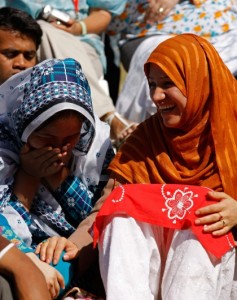Victoria leads in settling asylum seekers
 Victoria is the most welcoming state for refugees and asylum seekers as home to 38 per cent of the 24,500 asylum seekers currently in Australia, according to new government data.
Victoria is the most welcoming state for refugees and asylum seekers as home to 38 per cent of the 24,500 asylum seekers currently in Australia, according to new government data.
Statistics published by the Department of Immigration and Border Protection (DIBP) this week show 9,233 asylum seekers on bridging visas are living in Victoria, compared to just 7,787 in NSW, which hosts the second largest group.
Dandenong/Springvale and Sunshine/St Albans are home to the largest numbers of asylum seekers in Victoria, with Dandenong hosting 1,723.
There are 7,850 males and 1,383 females; and Afghanistan, Iran and Sri Lanka are where majority of asylum seekers have come from.
Most – more than 8,000 – are aged between 18 and 45 with almost 4,000 aged 26 to 35.
Chief Executive Officer of settlement agency AMES, Cath Scarth, said Victoria is a popular destination for asylum seekers and refugees because its people are welcoming and appreciative of diversity.
She said government and community agencies in Victoria provided state of the art services for asylum seekers.
“Victorians are basically welcoming people and we appreciate the importance of things like multiculturalism and diversity,” Ms Scarth said.
“Victoria has a long history of accepting new comers from other countries and all around us we can see the contributions migrants and refugees have made to our community through businesses, restaurants and cultural groups.
“Asylum seekers are actually moving from other states to come and live in Victoria because of all of these reasons,” Ms Scarth said.
At 30 June 2014, a total of 29,564 Bridging Visa ‘E’ (BVEs) had been granted to asylum seekers. Of these, 24,500 remain in the community; 15,231 with a current BVE and 9,269 awaiting grant of a further BVE, the DIBP report said.
The remaining 5,064 asylum seekers who were granted BVEs have either been granted a substantive visa, departed Australia, returned to immigration detention or are deceased.
Melbourne is recognised as one of the world’s most harmonious and culturally diverse communities.
Residents from more than 140 nations living side by side in Melbourne, were brought here by four main waves of migration.
The first wave was European settlement in the 1830s by mostly Anglo-Celtic people who displaced the area’s original inhabitants, the people of the Kulin nation.
The second was a flood of hopefuls from all over the world trying their luck during the 1850s Gold Rush. The influx saw the arrival of significant numbers of Chinese people.
The third wave was post-WWII refugees and displaced people from Europe as well as assisted migrants who were encouraged to come to bolster Australia’s population.
By 1976, 20 per cent of the city’s population spoke a non-English first language. The fourth significant wave came post-1970s, with migration from Vietnam and Cambodia.
In recent years, large numbers of international students have contributed to the multicultural fabric of Melbourne.
Laurie Nowell
AMES Senior Journalist












